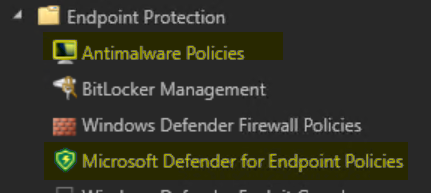Thank you for posting in Microsoft Q&A forum.
For Antimalware Policies, I believe you're familiar with it.
We can deploy antimalware policies to collections of Configuration Manager client computers to specify how Endpoint Protection protects them from malware and other threats. These policies include information about the scan schedule, the types of files and folders to scan, and the actions to take when malware is detected.
For Microsoft Defender for Endpoint Policies, it involves another product - Microsoft Defender for Endpoint.
Endpoint Protection can help manage and monitor Microsoft Defender for Endpoint. Microsoft Defender for Endpoint helps enterprises detect, investigate, and respond to advanced attacks on their networks. Configuration Manager policies can help you onboard and monitor Windows 10 or later clients.
See the article for more details:
https://learn.microsoft.com/en-us/mem/configmgr/protect/deploy-use/defender-advanced-threat-protection
And what is Microsoft Defender for Endpoint?
https://learn.microsoft.com/en-us/microsoft-365/security/defender-endpoint/microsoft-defender-endpoint?view=o365-worldwide
If the answer is the right solution, please click "Accept Answer" and kindly upvote it. If you have extra questions about this answer, please click "Comment".
Note: Please follow the steps in our documentation to enable e-mail notifications if you want to receive the related email notification for this thread.

